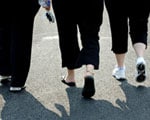A new study shows that older adults who take a brisk walk three times a week do better on memory tests and increase the size of their hippocampus, a portion of the brain involved with memory formation.

In otherwise healthy adults the hippocampus shrinks by about 1 to 2 percent a year, and the decrease is even more rapid among people with dementia. Brain shrinkage is associated with memory impairment in the elderly.
To see if brisk walk could ward off the age-associated memory loss, researchers from USA divided 120 sedentary adults without dementia in their mid to late 60s, into two groups: one group walked around a track for 40 minutes a day, three days a week, while the other group (the control group) did only stretching and toning exercises. Magnetic resonance images were collected before the intervention, after six months, and at the end of the one-year study. The authors also examined several biomarkers associated with brain health, including brain-derived neurotrophic factor (BDNF), a small molecule that is involved in learning and memory.
Both groups performed better on a test of spatial memory; memory that helps us to remember things like driving directions or where we left our keys. But the groups differed in one important way. MRI brain scans showed that after a year on the exercise program, the aerobic exercise group's hippocampus was about 2 percent bigger than it was when they started, the equivalent to a reversal in age-related brain shrinkage of about one to two years. It was found that those in the stretching group had a decrease of hippocampal volume of about 1.4 percent. Those who showed the greatest improvements in memory also showed the greatest increases in hippocampal volume. It was also found that those whose hippocampus grew the most showed higher levels of brain-derived neurotrophic factor, a growth factor in the blood that's associated with brain health.
The researchers also looked at the effect of aerobic exercise on two other regions of the brain, the caudate nucleus, which deteriorates with age and disease, and the thalamus, a more stable brain region, but no changes were evident. This suggests the effect is not just a widespread increase in brain mass, but is relatively specific to the hippocampus.
The findings suggest that loss of brain volume in old age can be delayed, and may even be reversible. The researchers say that even modest amounts of exercise by sedentary older adults can lead to substantial improvements in memory and brain health and such improvements have important implications for the health of older adults worldwide.
DoctorNDTV is the one stop site for all your health needs providing the most credible health information, health news and tips with expert advice on healthy living, diet plans, informative videos etc. You can get the most relevant and accurate info you need about health problems like diabetes, cancer, pregnancy, HIV and AIDS, weight loss and many other lifestyle diseases. We have a panel of over 350 experts who help us develop content by giving their valuable inputs and bringing to us the latest in the world of healthcare.













